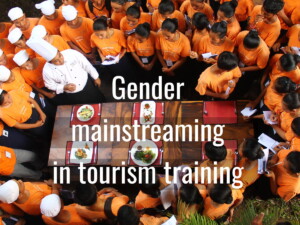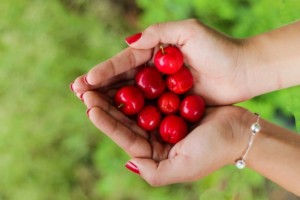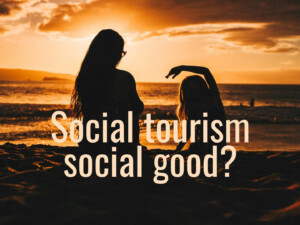Women’s travel & tourism livelihoods matter too: What I’m doing about it

In her second “Good Tourism” Insight, Karen Simmonds sets out her concerns about women in travel & tourism and broader society and how she’s taking action.
As I write, we have recently celebrated International Women’s Day on March 8. I was encouraged to see its theme and hashtag, #ChoosetoChallenge, being used in various circles. Here in the UK, we have just celebrated Mother’s Day too; another nod to women, the females, the maternal.
These issues are probably more topical in the UK right now, especially in my London neighbourhood, since the abduction and murder of Sarah Everard. Here there is ongoing dialogue about how we can help to forge a gender-equal world, foster greater understanding, and change policy to raise awareness against bias, celebrate women’s achievements, and truly take action for equality.
As the owner of Travel Matters, I have endeavoured to educate myself and my team about issues like inequality in tourism. We know that travel & tourism is one of the world’s most diverse sectors. And it’s 54% women. I can’t think of anything more exciting than seeing better representation and women’s empowerment throughout the sector.
I wonder whether the representation of more women will help us form a better strategy for our planet and Mother Nature? Excuse all the references to the female in this one, but I believe that it warrants a little time to ponder over and consider.
‘A woman’s work is never done’
Women, in some countries, are the most marginalised in their communities yet shoulder most of the responsibility. It’s not at all unusual for women to be working in the least well paid jobs with few opportunities for training. It is not uncommon for a woman to be managing a shop, their family, their savings, as well as looking after the resources and produce for a market.
When will they be sought out for their advice?
Also see the “GT” Insight “How can vocational education contribute to women’s empowerment in hospitality & tourism?”
Let’s take farming as an example. It is as much a task for women as it is men, as it was in the past and will be in the future. Women’s roles in agriculture have often been ignored. Women as well as men should have a say as to how we farm for the future. We are all stewards of our land and must produce and make food choices in a way that creates the kind of planet we want to live on harmoniously.
All in
Just as a family group is all in it together on their farm, we are all in this together on our planet. Let’s consider the 5Ps that the United Nations (UN) Department of Economic & Social Affairs sets out in its 2030 Agenda for Sustainable Development:
People: For all human beings fulfilling their potential in dignity and equality and in a healthy environment.
Planet: Protect the planet through sustainable consumption and production, managing natural resources, and taking urgent action on climate change.
Prosperity: For all human beings to enjoy prosperous and fulfilling lives and that economic, social, and technological progress occurs in harmony with nature.
Peace: Foster peaceful, just, and inclusive societies that are free from fear and violence.
Partnership: A revitalised global partnership, based on a spirit of strengthened global solidarity, focused on the needs of the poorest and most vulnerable, and with the participation of all countries, all stakeholders, and all people.
Still more work to do
I do not identify as a feminist. Regardless of identity or political labels, indications are that most women support equality and acknowledge that it has not yet been achieved. That is heartening, but there is work to be done.
The tourism sector can certainly work harder to be more inclusive. What this means is that men can work together more effectively with women, support them better, and step up to the challenge to oppose gender-based abuse and violence.
Also see Aadyaa Pandey’s “GT” Insight “How a community-based tourism & homestay network empowers women in Nepal”
It’s terrific that global organisations like the World Travel & Tourism Council (WTTC) have women as leaders. I am also encouraged that WTTC has set up the “Women Empowerment Initiative” to be launched at their Global Summit this April in Cancun, Mexico. And it’s great that it’s a hybrid event so we can all watch online.
WTTC also promises, through the Initiative, to create a Women’s Travel & Tourism Advisory Group. The group will consult with stakeholders to identify key activities and best practices to support women in universities and SMEs, as well as female entrepreneurs.
This is a great step forward and gives me hope.
A travel business tackles SDG 5 on gender equality
At Travel Matters, we set out a vision for the third decade of the business, which takes us to 2030. Our vision includes a roadmap to align with all 17 of the UN’s sustainable development goals (SDGs). We looked at how we can be more effective in incorporating sustainable management into the business model and how we demonstrate that.
I am particularly interested to learn how the tourism sector finds solutions to tackle SDG 5 on gender equality. At Travel Matters, we have committed to highlighting gender equality by partnering with Equality in Tourism, a not-for-profit organisation working to promote gender equality in destinations around the world. I am proud to be an associate. May I suggest that you research their work? If you are inspired by their vision and would like join me in helping to make it a reality, please contact them.
What do you think? Share a short anecdote or comment below. Or write a deeper “GT” Insight. The “Good Tourism” Blog welcomes diversity of opinion and perspective about travel & tourism because travel & tourism is everyone’s business.
Featured image (top of post): “Regardless of identity or political labels, indications are that most women support equality …” Image by geralt (CC0) via Pixabay.
About the author

Karen Simmonds is the founder of Travel Matters. In her own words: “Having travelled extensively, and worked in travel & hospitality for many years, I founded Travel Matters, which specialises in arranging bespoke worldwide adventures and holidays.
“I am passionate about building awareness about how we can travel responsibly and in a sustainable way, sharing good practice with clients and the industry. We aim to demonstrate how travel choices and decisions can have an positive impact on the communities we visit. I set up Make Travel Matter to help others understand some of the issues around responsible travel. I have spoken at primary schools to educate children about travelling responsibly and at the Responsible Business Convention in London.”





